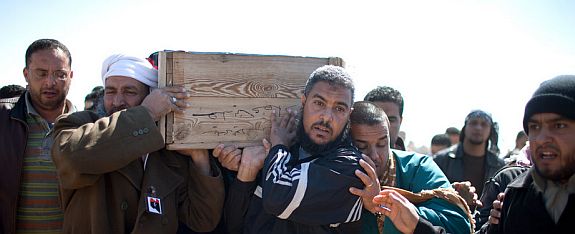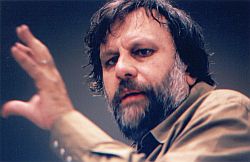As some commentators solemnly warn about the dangers of a backlash if the Arab democratic revolution was to become poisoned by American involvement in a no-fly zone over Libya, they fail to note a rising chorus inside Libya: anger towards the United States because of its reluctance to become involved.
There’s stunning paradox here. Three decades ago, America’s support of the Mujahadeen in Afghanistan sowed the seeds for a jihad against America. And now, America’s lack of support for a revolution in Libya may eventually have the same effect.
There are those who would on this basis jump to the conclusion that this demonstrates a visceral hatred of America across the Muslim world, but I would argue the exact opposite: that it demonstrates that attitudes towards America in a region in which it exerts so much influence are predominantly pragmatic and rooted in the present tense: they are a response to whatever the United States is doing or is not doing at any particular time.
Everyone here seems to have a gun these days, in a lawlessness tempered only by revolutionary ebullience. Young men at the front parade with the swagger that a rocket-propelled grenade launcher grants but hint privately that they will try to emigrate if they fail. Anti-American sentiments build, as rebels complain of Western inaction. And the hint of radicalization — religious or something more nihilist — gathers as the momentum in the three-week conflict clearly shifts to the forces of one of the world’s most bizarre leaders.
“This better not go on any longer,” said Dr. Salem Langhi, a surgeon who was working around the clock at a hospital that was abandoned as Colonel Qaddafi’s forces rushed in. “It will only bring misery and hard feelings among people. Losing lives and limbs doesn’t make anyone optimistic.”
No one seems to know what to call this conflict — a revolution, a civil war or, in a translation of what some call it in Arabic, “the events,” a shorthand for confusing violence. It certainly looks like a war — the thud of shelling in the distance offers a cadence to occasional airstrikes, their targets smoking like oil fires that turn afternoon to dusk. The dead and dismembered are ferried in ambulances driven by medical students.
But especially for the rebels, there is an amateurishness to the fighting that began as a protest and became an armed uprising.
“We’re here because we want to be,” said one of the fighters, Mohammed Fawzi.
His sense of a spontaneous gathering offers a prism through which to understand the war: the front at Ras Lanuf is the most militarized version of Tahrir Square in Cairo, where hundreds of thousands wrote a script of opposition and street theater that brought down a strongman everyone thought would die in office. The fighting here feels less like combat in the conventional sense and more like another form of frustrated protest.
Some vehicles bear the inscription Joint Security Committee, but nothing is all that coordinated across a landscape that seems anarchic and lacking in leadership. Fighters don leather jackets from Turkey, Desert Fox-style goggles, ski masks, cowboy hats and World War II-era British waistcoats.
Slogans are scrawled in the street just miles from the fighting. “Muammar is a dog,” one reads. A man who bicycled for three days from Darnah, far to the east, became a local celebrity at the front. Free food is offered, as it was in the canteens in Tahrir, and fighters rummaged through donated clothes. “These are American jeans!” one shouted.
Young men revel in the novelty of having no one to tell them not to play with guns. “God is great!” rings out whenever a volley of bullets is fired into the air.
“Some guys consider this a lot of fun, and they’re hoping the war lasts a lot longer,” said Marwan Buhidma, a 21-year-old computer student who credited video games with helping him figure out how to operate a 14.5-millimeter antiaircraft battery.
An hour or so before Friday’s headlong retreat, a gaggle of young men in aviator sunglasses and knit caps danced on military hardware, thrusting weapons into the air.
“Where is the house of the guy with really bad hair?” they chanted, referring to Colonel Qaddafi, jumping on spent cartridges and empty milk cartons. “Let’s go down the road and see it!”
The protests across the Arab world have disparate demands — from power-sharing in Bahrain to the dismantling of the regime in Egypt. But the demographic shift they represent as a generation comes of age is their constant. It is no different in Libya, where the young look at their parents’ lives in disgust and vow that they will not live without dignity, a say in their future and a constitution — a catchall term for the rule of law.
Nearly 70 percent of Libya’s population is under the age of 34, virtually identical to Egypt’s, and a refrain at the front or faraway in the mountain town of Bayda is that a country blessed with the largest oil reserves in Africa should have better schools, hospitals, roads and housing across a land dominated by Soviet-era monotony.
“People here didn’t revolt because they were hungry, because they wanted power or for religious reasons or something,” said Abdel-Rahman al-Dihami, a young man from Benghazi who had spent days at the front. “They revolted because they deserve better.”
The seeming justice of that revolt has prompted moments of naïveté — time and again, young people express amazement that Colonel Qaddafi’s forces would deploy tanks and warplanes against them — with an incipient and unpredictable frustration over demands unmet.
The revolt remains amorphous, but already, religion has emerged as an axis around which to focus opposition to Colonel Qaddafi’s government, especially across a terrain where little unites it otherwise. The sermon at the front on Friday framed the revolt as a crusade against an infidel leader. “This guy is not a Muslim,” said Jawdeh al-Fakri, the prayer leader. “He has no faith.”
Deserting officers have offered what leadership there is, along with some men who call themselves veterans of fighting in Afghanistan or an Islamist insurgency in eastern Libya in the 1990s. The shift remains tentative — and far short of the accusations made by Colonel Qaddafi that he faces an insurgency led by Al Qaeda — but even the opposition acknowledges the threat of radicalization in a drawn-out conflict.
Dr. Langhi, the surgeon, said he scolded rebels who called themselves mujahedeen — a religious term for pious fighters. “This isn’t our situation,” he pleaded. “This is a revolution.”
Sitting on ammunition boxes, four young men from Benghazi debated the war, as they watched occasional volleys of antiaircraft guns fired at nothing. They promised victory but echoed the anger heard often these days at the United States and the West for failing to impose a no-flight zone, swelling a sense of abandonment.
It is unknown whether the U.S. targeted the teenager or whether he was merely “collateral damage.” The reason that’s unknown is because the Obama administration refuses to tell us. Said the Post: “The officials would not discuss the attack in any detail, including who the target was.” So here we have yet again one of the most consequential acts a government can take — killing one of its own citizens, in this case a teenage boy — and the government refuses even to talk about what it did, why it did it, what its justification is, what evidence it possesses, or what principles it has embraced in general for such actions. Indeed, it refuses even to admit it did this, since it refuses even to admit that it has a drone program at all and that it is engaged in military action in Yemen. It’s just all shrouded in secrecy.



 Many American academics and pundits from thinktankland should study the way Slavoj Žižek expresses himself. Passionate, emphatic, uninhibited, eccentric, and humorous — above all, a man who knows what it means to speak your mind. This is a display that shows that deep analysis does not need the protection of cover-your-ass-caveats or manicured sobriety. It can be an act of genuine self-expression.
Many American academics and pundits from thinktankland should study the way Slavoj Žižek expresses himself. Passionate, emphatic, uninhibited, eccentric, and humorous — above all, a man who knows what it means to speak your mind. This is a display that shows that deep analysis does not need the protection of cover-your-ass-caveats or manicured sobriety. It can be an act of genuine self-expression.